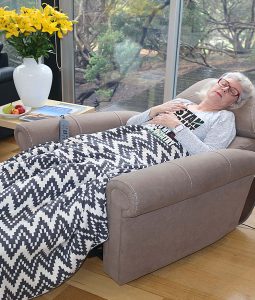The progressive deterioration of mental functionality is known as Dementia, and can be caused to the loss and/or damage of nerves cells or neurons in the brain. There are several diseases and causes that affect the brain, including Alzheimer’s Disease and also traumatic brain injuries, and usually occurs over a period of time One of the most important elements of caring for a dementia patient is to understand it, and that’s what we will be doing in the following sections.
What is Dementia?
There are many types of dementia, but in the end it all leads to various substantial losses (of memory, reasoning, judgement), as well personality, behavioural and physical changes. However, it should be mentioned that each person might experience dementia differently as it be based on various factors including age and other underlying issues that they may be presented with.
There are various stages of dementia, and once a person has been diagnosed with it, the symptoms and characteristics will worsen over time it (as neurons/brain cells loss or damage cannot be reversed). Â The following include the different stages of dementia as it progresses over time.
Mild Dementia
Mild Dementia is the first stage, whereby it often starts with the patients being unable to recall things as easily as they used to. Remembering words and names is one of the first signs, along with retaining new information and recalling them. One of the functional tasks that they will be unable to do would be to drive by themselves. Patients also start to show signs of depression, including sadness and anxiety.
Moderate Dementia
During this stage, you will find that the onset of judgment and physical functional difficulties as well sensory processing starts to be impaired. Due to this fact, personal hygiene, use of inappropriate language and even wandering may start to occur. This has been noted as one of the most challenging of times for caregivers, where modifications to homes is called for including the installation of locks or safety latches to prevent the patients from wandering out of the house.
Severe Dementia
Severe dementia involves extensive memory loss, often coupled with lack or limited mobility issues requiring mobility solutions to aid in the process. In addition, bowel and bladder control is impaired. You may look at Palliative Care at this point and caregivers may need to look for daily living aids or nursing aids to make it easier to care for their dementia patients. During this stage, the patient may not be able to recognise people, including family and caregivers alike.
Causes of Dementia
Whilst Alzheimer’s disease is one of the most common causes of dementia, brain injury can too cause it, including the after effects of a stroke, heart attack or even a brain tumour. However, there are other diseases or disorders that may affect your brain leading to dementia such as the following, including neurodegenerative diseases.
- Cerebrovascular Disease
- Prion Disease
- HIV Infection
- Dementia with Lewy bodies
- Parkinson’s Disease
- Hungtington’s Disease
- Pick’s Disease
- Posterior cortical atrophy
- Normal Pressure Hydrocephalus (water on the brain)
- Down’s Syndrome (likely to develop young on-set Alzheimer’s)
Caring for Dementia Patients
When it comes to being a caregiver for dementia patients, you may experience high levels of stress and emotions. As a caregiver, you should consult with palliative care to come up with the best solutions and seek help when needed, especially in trying to understand the various stages and adapt and prepare yourself for what should be expected.






